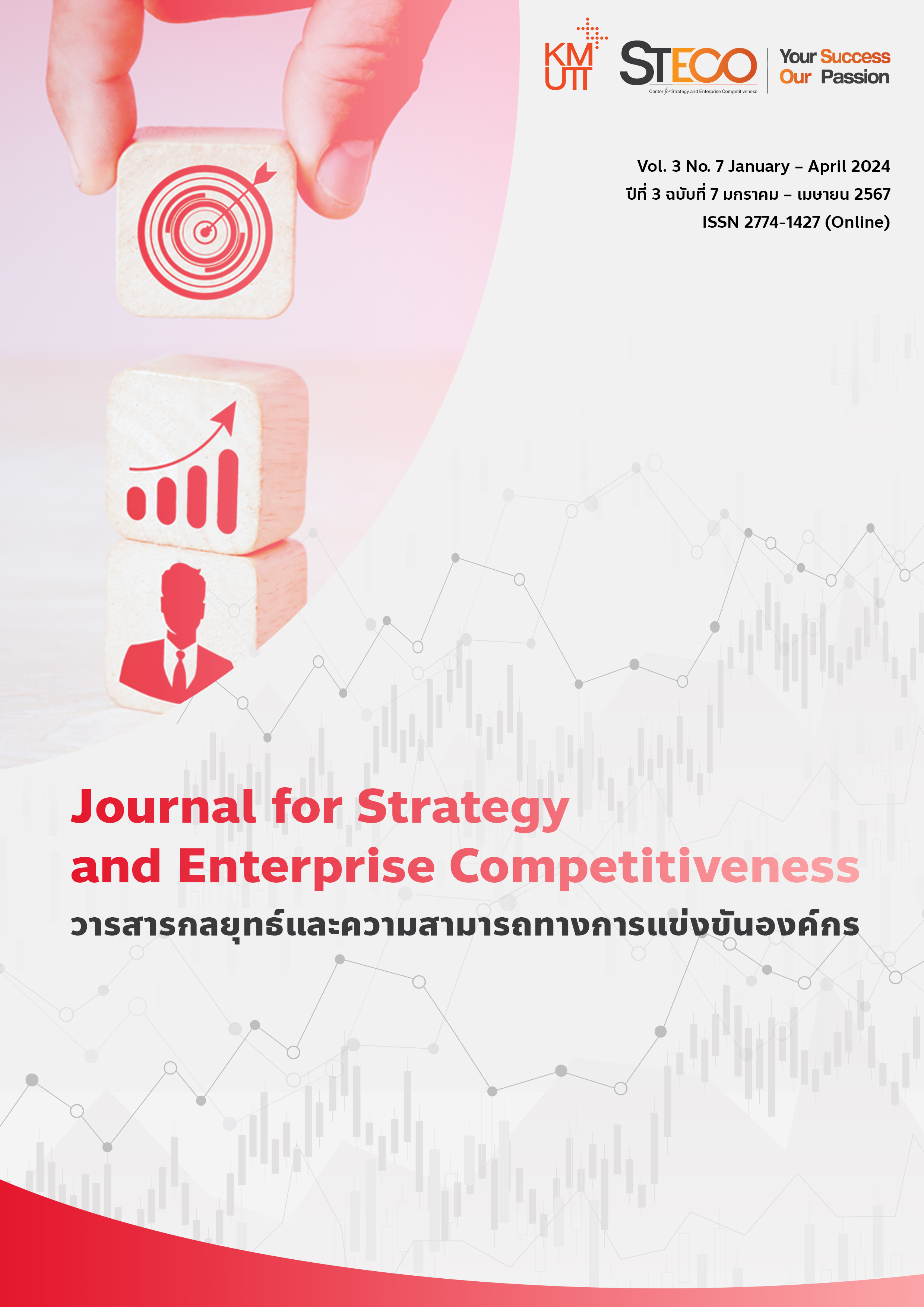ผลสัมฤทธิ์ทางการเรียนที่มีต่อการสอนโดยใช้เกมแบบจำลองสถานการณ์ ในรายวิชานวัตกรรมและการประกอบธุรกิจ
คำสำคัญ:
ผลสัมฤทธิ์ทางการเรียน, เกมแบบจำลองสถานการณ์, นวัตกรรมและการประกอบธุรกิจบทคัดย่อ
งานวิจัยนี้มีวัตถุประสงค์เพื่อเปรียบเทียบผลสัมฤทธิ์ทางการเรียนของผู้เรียน และความพึงพอใจของผู้เรียน ที่มีต่อการสอนโดยใช้เกมแบบจำลองสถานการณ์และการสอนแบบบรรยายในการเรียน
การสอนวิชานวัตกรรมและการประกอบธุรกิจ เป็นงานวิจัยในห้องทดลองที่มีการกำหนดผู้ทดลองไว้แล้ว
โดยมีกลุ่มตัวอย่างเป็นนักศึกษา คณะวิทยาการจัดการ สาขาการจัดการ ชั้นปีที่ 2 แบ่งออกเป็นกลุ่มควบคุม 15 คน และกลุ่มทดลอง 15 คน กลุ่มหนึ่งจะได้รับการสอนแบบบรรยาย ส่วนอีกกลุ่มหนึ่งจะได้รับการสอนโดยใช้เกมแบบจำลองสถานการณ์ วิเคราะห์ข้อมูลด้วยสถิติเชิงพรรณนา ได้แก่ ค่าเฉลี่ย และส่วนเบี่ยงเบนมาตรฐาน และใช้สถิติเชิงอนุมาน ได้แก่ การเปรียบเทียบค่าเฉลี่ย (Paired t-test) และเปรียบเทียบค่าผลต่างของทั้งสองกลุ่ม (Independent Sample t-test)
ผลการวิจัยพบว่า การสอนโดยใช้เกมแบบจำลองสถานการณ์เข้ามาใช้ในการเรียนการสอน
วิชานวัตกรรมและการประกอบธุรกิจ ช่วยให้ผู้เรียนมีผลสัมฤทธิ์ทางการเรียนที่ดีขึ้นกว่าการสอน
แบบบรรยาย ที่ระดับนัยสำคัญ 0.05 และผู้เรียนมีความพึงพอใจต่อการสอนโดยใช้เกมแบบจำลองสถานการณ์มากกว่าการสอนแบบบรรยายอยู่ในระดับมากที่สุด
เอกสารอ้างอิง
Am, J. B., Furstenthal, L., Jorge, F., and Roth, E. (2020). Innovation in a crisis: Why it is more critical than ever. New Jersey: McKinsey & Company.
Chavalit, T. (2023). Development of academic achievement in the Thai language subject on nouns of 4 grade students using game-based learning. Khon Kaen Innovation For Thai Education.
Chincharoen, P. (2021). Development of board game-based learning activity for ecoliteracy promotion in grade 10th students. Master Degree of Education, Science Education, Naresuan University.
Chuayprakong, C. (2022). The development problem solving by using the game based learning (GBL) on money policy and fiscal policy for high school 6 students at Dongtanwittaya school. Master Degree of Education, Graduate school, Mahachulalongkornrajavidyalaya University.
Daoruang, R. (2023). PRA-TO to innovation. Proceedings of the 6th KRU National Academic Conference 2023, 8 September 2023, Thailand, 194-208. Kanchanaburi: Kanchanaburi Rajabhat University.
Daoruang, R., and Sapsanguanboon, W. (2023). The Study of Entrepreneurial Leadership Characteristics and Creative Innovation Factors Affecting Competitive Advantage of Small and Medium Enterprises in Kanchanaburi. NIDA Business Journal, 30, 105-122.
Dogani, B. (2023). Active learning and effective teaching strategies. International Journal of Advanced Natural Sciences and Engineering Researches, 7(4), 136-142.
Evan, W. (1966). Organization Lag. Human Organization, 25(1), 51-53. https://doi.org/10.17730/humo.25.1.v7354t3822136580
Fisher, K. (2010). Technology-Enabled Active Learning Environments: An Appraisal. CELE Exchange, Centre for Effective Learning Environments, 2010(7), 1-9. https://doi.org/10.1787/5kmbjxzrmc0p-en.
Gibson, D., Aldrich, C., and Prensky, M. (2007). Games and Simulations in Online Learning: Research and development Frameworks. Hershey: Information Science Publishing.
Hasso Plattner. (2010). An introduction to design thinking process guide. Institute of design at Stanford. Retrieved from https://web.stanford.edu/~mshanks/MichaelShanks/files/509554.pdf
Keeley, L., Pikkel, R., Quinn, B., and Walters, H. (2013). Ten Types of Innovation: The discipline of building breakthroughs. New Jersey: John Wiley & Sons, Inc.
Kunpol, S. (2023). Game based learning to development of achievement in mathematics learning of mathayomsuksa 1 students. MBU Education Journal, Faculty of Education Mahamakut Buddhist University, 11(2), 247-259.
Lehtonen, J. M., and Haho, T. L. P. (2003). Experimental learning through a simulation game in teaching of production management. In International Workshop of the IFIP WG 5.7: Experimental Interactive Learning in Industrial Management 22-24 May, 2003, Denmark, 63-74. Aalborg: Center for Industrial Production, University of Aalborg.
Masahiro, N. (2007). Teaching Materials Using Board Game and Classifying Table for Helping Understand Binomial Distribution. International Statistical Institute, 56th Session.
Maslow, A. H. (1987). Motivation and personality (3rd Edition). New York: Harper & Row Publishers.
National Innovation Agency. (2005). Thai Innovation. Retrieved from https://www.nia.or.th/%E0%B9%80%E0%B8%9B%E0%B8%B4%E0%B8%94%E0%B9%82%E0%B8%A5%E0%B8%81%E0%B8%99%E0%B8%A7%E0%B8%B1%E0%B8%95%E0
Prasan, S., Hengpraprom, S., Buathong, N., and Rattananupong, T. (2017). Prevalence of nomophobia among Thai undergraduate students using smartphones in public university. Chulalongkorn Medical Journal, 61(2), 248-259. https://doi.org/10.58837/CHULA.CMJ.61.2.9
Prensky, M. (2003). Digital game-based learning. Computers in entertainment (CIE), 1(1), 21-21.
Raj, R., Donald, C., Patil, A., M. Y., M., and P., S. (2022). The Game of Game-Based Learning. In C. Lane (Ed.), Handbook of Research on Acquiring 21st Century Literacy Skills Through Game-Based Learning (pp. 1-12). IGI Global. https://doi.org/10.4018/978-1-7998-7271-9.ch001
Royal Society. (2013). Royal Institute Dictionary B.E 2554. Bangkok: Nanmeebooks Co., Ltd.
Ruenrom, G. (2015). Marketing Research. (8th Edition). Bangkok: CU Press.

ดาวน์โหลด
เผยแพร่แล้ว
รูปแบบการอ้างอิง
ฉบับ
ประเภทบทความ
สัญญาอนุญาต
ลิขสิทธิ์ (c) 2024 วารสารกลยุทธ์และความสามารถทางการแข่งขันองค์กร

อนุญาตภายใต้เงื่อนไข Creative Commons Attribution-NonCommercial-NoDerivatives 4.0 International License.
ข้อคิดเห็นที่ปรากฏและแสดงในเนื้อหาบทความต่าง ๆ ในวารสารกลยุทธ์และความสามารถทางการแข่งขันองค์กร ถือเป็นความเห็นและความรับผิดชอบโดยตรงของผู้เขียนบทความนั้น ๆ มิใช่เป็นความเห็นและความรับผิดชอบใด ๆ ของศูนย์กลยุทธ์และความสามารถทางการแข่งขันองค์กร มหาวิทยาลัยเทคโนโลยีพระจอมเกล้าธนบุรี
บทความ ข้อมูล เนื้อหา และรูปภาพ ฯลฯ ในวารสารกลยุทธ์และความสามารถทางการแข่งขันองค์กร ถือเป็นลิขสิทธิ์เฉพาะของศูนย์กลยุทธ์และความสามารถทางการแข่งขันองค์กร มหาวิทยาลัยเทคโนโลยีพระจอมเกล้าธนบุรี หากบุคคลหรือหน่วยงานใดต้องการนำทั้งหมดหรือส่วนหนึ่งส่วนใดไปเผยแพร่ต่อหรือเพื่อกระทำการใด ๆ จะต้องได้รับอนุญาตเป็นลายลักษณ์อักษรจากศูนย์กลยุทธ์และความสามารถทางการแข่งขันองค์กร มหาวิทยาลัยเทคโนโลยีพระจอมเกล้าธนบุรีก่อนเท่านั้น


